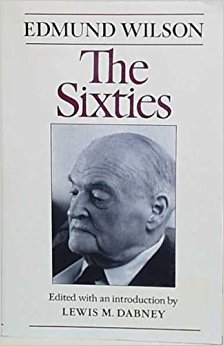The disappointing qualities of this final volume of Edmund Wilson’s diaries, due partially to surfeit (over 2,000 pages of The Twenties, The Thirties, The Forties, and The Fifties precede these almost 1,000), have finally to do with the limitations of the modern secular intellectual mind as it wrestles with the perceived insufficiency, tawdriness, and dishonesty of the contemporary world. Viewed from this perspective, even Wilson’s enormous intellectual curiosity seems less an inspiration and more a source of frustration and depression for the reader who has devotedly kept company with the critic and author from his youthful days as a New York bohemian to his finish as the fearsome Old Man of Talcottville. As a writer and as a human being, Wilson was in his own way a great man and a great American, at once an original and a type that is, alas, now nearly extinct. The scion of an established Middle Atlantic family, he inherited the positivism of the 19th-century American upper-middle class, as well as the strong-mindedness that never feared to be mistaken for simple eccentricity; the first led him into a flirtation with communism, the second rescued him from his interest in Marxist theory and practice and caused him finally to renounce the liberal bureaucratic statism that his former ideals had produced in postwar America. (“Whether I stay or leave,” he wrote in the 1960’s, “this is no longer the place for me.”) Substantially, he devoted his life to tracking the Enemy to his lair, only to discover in old age that he had been sleeping with him for decades. By the time he made this discovery and began—characteristically—to talk and write about it, he was too much the Grand Old Man to be punished or criticized for his heresies; instead, as Bill Kauffman observed recently in these pages, he was merely tolerated. All his life he persisted in cultivating too many interests and toying with too many intellectual baubles; he was a man who essentially could not see the woods for the trees and who was egregiously wrong on too many subjects. His intellect, though always in play, was largely undiscriminating. “Do you believe in God?” he asked a friend in his last years. “I don’t.” He didn’t need God; he had puppetry instead. He died in 1972 at the age of 77, still a morally strong man of learning without real wisdom, but finally clearsighted about the aggressive monster his country had become.
[The Sixties: The Last Journal, 1960-1972, by Edmund Wilson, edited by Lewis M. Dabney (New York: Farrar, Straus & Giroux) 968 pp., $35.00]

Leave a Reply